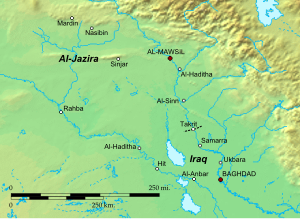Battle of Baghdad (946)
| Battle of Baghdad (946) | |||||||
|---|---|---|---|---|---|---|---|
| Part of the Buyid-Hamdanid Wars | |||||||
 Boundary established between the Buyid and Hamdanid amirates at the end of the war (dashed line). |
|||||||
|
|||||||
| Belligerents | |||||||
| Buyid amirate of Iraq | Hamdanid amirate of Mosul | ||||||
| Commanders and leaders | |||||||
|
Mu'izz al-Dawla Abu Ja'far Saymari Ispahdost |
Nasir al-Dawla Abu Ja'far Muhammad ibn Shirzad Abu 'Abdallah Husayn b. Sa'id |
||||||
The Battle of Baghdad (946 AD) was fought between the forces of the Buyid Emirate of Iraq under Mu'izz al-Dawla and the Hamdanid Emirate of Mosul under Nasir al-Dawla within the city of Baghdad. The battle lasted for several months; it eventually ended in victory for the Buyids, who expelled the Hamdanids from Baghdad with a major offensive and secured control of the city.
The battle was the first conflict in the Buyid-Hamdanid Wars; it was also the only one to occur largely on Buyid, rather than Hamdanid, territory.
Baghdad became a Buyid possession when Ahmad ibn Buya advanced from al-Ahwaz with his army and entered the city in December 945. Upon his arrival, he met with the Abbasid caliph al-Mustakfi, who agreed to give him control of the affairs of the state and conferred on him the honorific of "Mu'izz al-Dawla." News of this event was received negatively by the Hamdanid amir Nasir al-Dawla, who ruled over Mosul and the districts of the eastern Jazira. Nasir al-Dawla had previously controlled Baghdad in 942 and he still entertained hopes of regaining the city; Mu'izz al-Dawla's takeover of the capital was therefore an unwelcome development for him.
Nasir al-Dawla had reason to be confident that he could defeat Mu'izz al-Dawla if he made an attempt to capture Baghdad. His army had been bolstered by the arrival of numerous Turkish soldiers who had fled from Baghdad just before Mu'izz al-Dawla's entrance into the capital, and he was much more familiar with the territory between Mosul and Baghdad than his rival was. Mu'izz al-Dawla, on the other hand, was on less secure ground; Baghdad was in a sorry state thanks to years of mismanagement and he was hamstrung by its numerous financial and military problems. Nasir al-Dawla furthermore gained a pretext for war when in January 946 Mu'izz al-Dawla deposed and blinded the caliph al-Mustakfi and replaced him with the more obedient al-Muti'. As a result of these factors, Nasir al-Dawla took a belligerent tone with the Buyids; he withheld the payment of tribute to Baghdad, refused to recognize al-Muti' as caliph and continued to mint coins in al-Mustakfi's name.
...
Wikipedia
